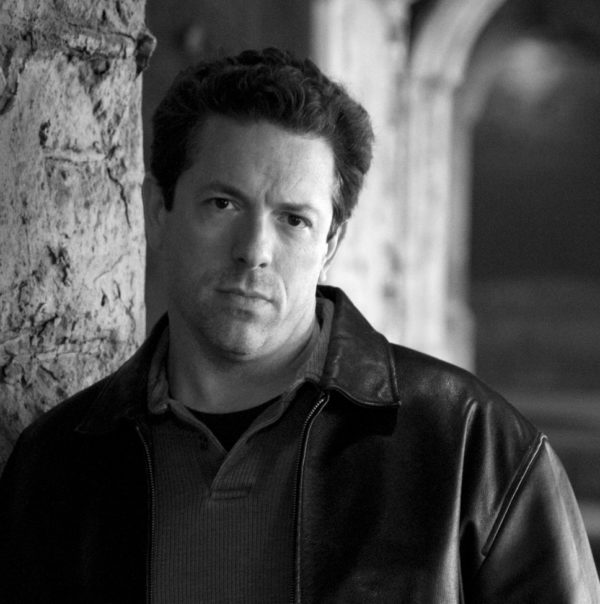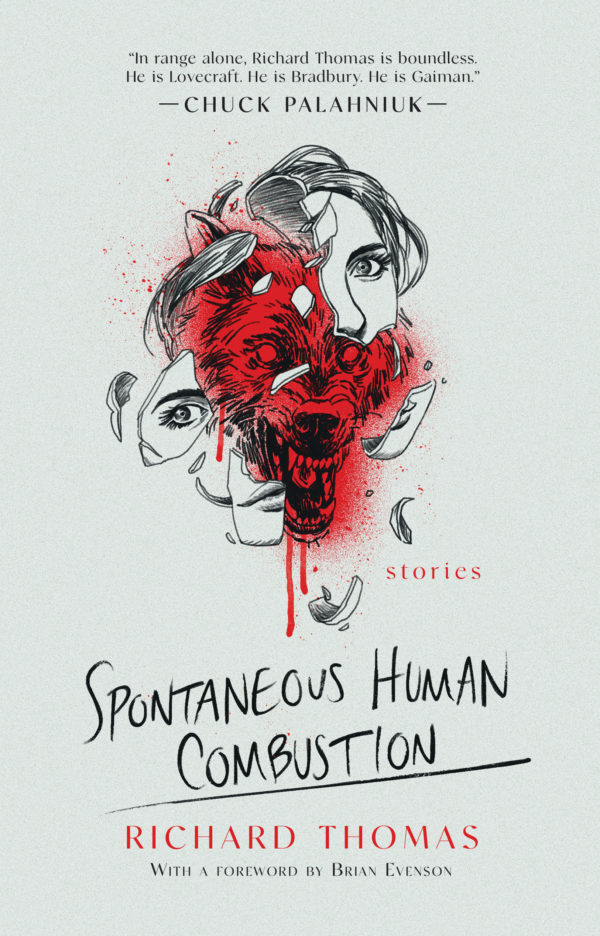
Welcome to my weekly Author Spotlight. I’ve asked a bunch of my author friends to answer a set of interview questions, and to share their latest work.
GIVEAWAY: Comment on this post below for a chance to win an eBook copy of Richard’s book Tribulations.
Today: Richard Thomas is the award-winning author of eight books:
- Disintegration and Breaker (Penguin Random House Alibi)
- Transubstantiate
- Herniated Roots
- Staring Into the Abyss
- Tribulations
- Spontaneous Human Combustion (Turner Publishing)
- The Soul Standard (Dzanc Books).
He has been nominated for the Bram Stoker, Shirley Jackson, Thriller, and Audie awards. His over 165 stories in print include The Best Horror of the Year (Volume Eleven), Behold!: Oddities, Curiosities and Undefinable Wonders (Bram Stoker winner), Cemetery Dance (twice), PANK, storySouth, Gargoyle, Weird Fiction Review, Shallow Creek, The Seven Deadliest, Gutted: Beautiful Horror Stories, Qualia Nous, Chiral Mad (numbers 2-4), PRISMS, and Shivers VI. Visit www.whatdoesnotkillme.com for more information.
Thanks so much, Richard, for joining me!
J. Scott Coatsworth: How would you describe your writing style/genre?
Richard Thomas: I started out writing mostly horror and thrillers, and was in fact nominated for a Thriller Award for my novel, Breaker. But over the years that has turned into more neo-noir and new-weird, under the broader speculative umbrellas, which includes fantasy, science fiction, and horror. I sometimes tap into the transgressive, and at the other end of the spectrum, I also try to let literary influences shape my work. I’ve been putting more hope in my work of late, as well, so hopepunk has been part of my voice as well, and magical realism, too.
JSC: How long on average does it take you to write a book?
RT: It’s been all over the place. My first novel, Transubstantiate I wrote over two years, but the first draft was written 700-1,000 words a day, on my lunch hour, at work. My second novel, Disintegration too six years from start to publication, putting it aside for a year or two to finish my MFA, writing 40,000 words in one week to finish it. Breaker, my third novel, I wrote in a fever dream, fugue state of 25 days, on deadline, one winter, as my beard grew in and I was slowly losing my mind. My current novel, Incarnate, took two weeks to get to the 52,000-word mark, and then the last couple of weeks, writing one day a week, to get to the 75,000-word total. So it really varies.
JSC: Why did you choose to write in your particular field or genre? If you write more than one, how do you balance them?
RT: If we’re talking about horror, then I think it goes back to my childhood and seeing a man plummet to his death off the St. Louis Arch. I was there hiking with my Boy Scout troop, and saw it all—the parachute, the tangling of it on the leg of the arch, falling down, hitting and bouncing, and a sheen of blood that covered the ground as far as I could see. I didn’t know that human body could hold so much blood. So when I write scary stories, I want that thrill, that rollercoaster ride, and then to come out the other side feeling something—fear of the horror continuing, relief at having survived it, wonder at having seen something that they didn’t know existed, hope from seeing the good guys win. I want to scare people, unsettle them, and then let them go.
JSC: Are there underrepresented groups or ideas featured if your book? If so, discuss them.
RT: Yes, particularly in my novelette, “Ring of Fire.” I was invited to be a part of a horror anthology, that had a seven deadly sins theme. I was assigned lust. I didn’t want it to be Hellraiser—pain and pleasure. And I didn’t want it to be rapey or misogynistic, but I knew the protagonist would be a bad man, in order to be the necessary catalyst for change, this spontaneous evolutionary event. I was very conscious of the #metoo movement, and so I had to write and rewrite, look at tone and focus, address the dark moments but with tact, in subtle ways. And at the end, there is a whole epilogue that I didn’t see coming, that really helped to address these themes as well, and end with the POV that I think is necessary here to have the most impact, agency, and emotion.
JSC: Are you a plotter or a pantster?
RT: Definitely a pantser. Though one of my students, Jeremy Mallory presented the idea of an “oysterer” somebody that takes a bit of grit and sand and dirt and applies pressure over time (what I call “chewing on an idea”) for a long times—days, weeks, months—until something beautiful and valuable comes out of it. I tend to write from a source—one idea or emotion—and then follow it forward, just seeing as far as the headlights of my car will split the darkness. I can see just a bit down the road. I like that sense of discovery, as my characters also figure out who they are and what they might do. I’m a bit of a method writer as well, putting on the skin suit that is my protagonist, and sometimes doing research that involves me tapping into the worlds I create, as well.
JSC: How long does it take you to write the first draft?
RT: I’m pretty fast. But for me, it’s feast or famine. I have written short stories that are 3,000 words or 5,000 words or even 6,660 words in one day—idea, to rough, to finished draft, turned in, and accepted. And for my novels, 40,000 words in a week, or 75,000 words in 25 days, my record being 12,000 words in one day to finish Breaker. I’m not precious with my writing. It works or it doesn’t. When I’m “in the zone” this “body without organs” that the philosopher Deleuze talks about, the world falls way, and I just try to hold on, and channel the visions. It’s very cinematic for me when it’s working, and luckily I can type 70 WPM so I’m able to keep up.
JSC: What is the most heartfelt thing a reader has said to you?
RT: I’ve heard from readers all over the world, and any time a reader tells me that my work gave them hope, kept them from hurting themselves, showed them how to write a certain genre or scene, inspired them to keep going, or to take a chance on a story, whenever I’ve been able to provide them with an epiphany, a realization, a bit of wonder, or laugher, or horror, or a good cry—I feel like I’ve done my job. It’s an intimate experience, writing and reading, and I invite the audience in close, to sit here with me, to put on that skin suit and walk with me, into the darkness, into the magic, and see what we can find together. They trust me to not waste their time, to show them something they haven’t seen before, and to impact them emotionally. This relationship means a lot to me, so I put a lot of myself into my work. If I come away from a story, or scene, or book and I’m entirely spent—emotionally, mentally, spiritually, and physically—then I know I’ve given it my all. It’s the only way I can write. If I have nothing to give, then the work is flat and uninspired, so I have to go into it healthy, excited, rested, and whole.
JSC: How did you choose the topic for Spontaneous Human Combustion?
RT: The title and theme of Spontaneous Human Combustion is not about bursting into flames. It’s about the spontaneous HUMAN combustion of these stories. What does it mean to be human? How does our humanity, or lack of humanity, effect those around us? And what happens when we run into the uncanny, the surreal, and the veil is dropped, showing us more than we know existed? Many of my stories tap into subjects and themes that revolve around this concept—fatherhood, the old gods, evolution, the collective subconscious, purgatory, fate, fantasy vs. reality, hope, the supernatural, and so much more.
JSC: What was the weirdest thing you had to Google for your story?
RT: So much. Everything from satanic rituals to Chicago gangs and their colors, to the rarest elements on the planet, and different methods of psychanalysis and treatment. If a story requires research—guns, plants, animals, cultures, cities, weather—I try to look up as much as I can (such as the arctic, and Alaska, and sin-eaters for my current novel, Incarnate) and then close those windows and put away those results, allowing myself room to make it my own. I want to study it, and get it right, and then turn it into fiction, leaving room for the reader, taking it a bit farther on down the road.
JSC: Tell me one thing hardly anyone knows about you.
RT: I’m an Eagle Scout. Boy Scouts was a big part of my childhood—hiking, camping, getting outdoors—and I think that really helped me to be independent, to open up my mind and imagination, and to really come to love the great outdoors. I still love hiking. I went to Philmont Scout Rand in New Mexico as a kid, hiking 110 miles in a week, carrying in everything we needed to survive, and it was a wonderful experience.
JSC: What are you working on now, and what’s coming out next? Tell us about it!
RT: I just wrote the final scene for my arctic horror novel that features a sin-eater. It’s not entirely done, still need to tweak the second act, and I’m running it past my arctic advisor Repo Kempt right now, but overall I’m very happy with it. It’s my usual maximalist horror, but with some hope. I’ve been thinking of it as a mix between The Thing, The Terror, and The Giver. Cold, isolated, with moments of visceral, unsettling horror, but also magic, wonder, the uncanny, and the surreal.
And now for Richard’s latest book: Spontaneous Human Combustion:
“In range alone, Richard Thomas is boundless. He is Lovecraft. He is Bradbury. He is Gaiman.” —Chuck Palahniuk
With a Foreword by Brian Evenson
In this new collection, Richard Thomas has crafted fourteen stories that push the boundaries of dark fiction in an intoxicating, piercing blend of fantasy, science fiction, and horror. Equally provocative and profound, each story is masterfully woven with transgressive themes that burrow beneath the skin.
- A poker game yields a strange prize that haunts one man, his game of chance now turned into a life-or-death coin flip.
- A set of twins find they have mysterious new powers when an asteroid crashes in a field near their house, and the decisions they make create an uneasy balance.
- A fantasy world is filled with one man’s desire to feel whole again, finally finding love, only to have the shocking truth of his life exposed in an appalling twist.
- A father and son work slave labor in a brave new world run by aliens and mount a rebellion that may end up freeing them all.
- A clown takes off his make-up in a gloomy basement to reveal something more horrifying under the white, tacky skin.
Powerful and haunting, Thomas’ transportive collection dares you to examine what lies in the darkest, most twisted corners of human existence and not be transformed by what you find.

